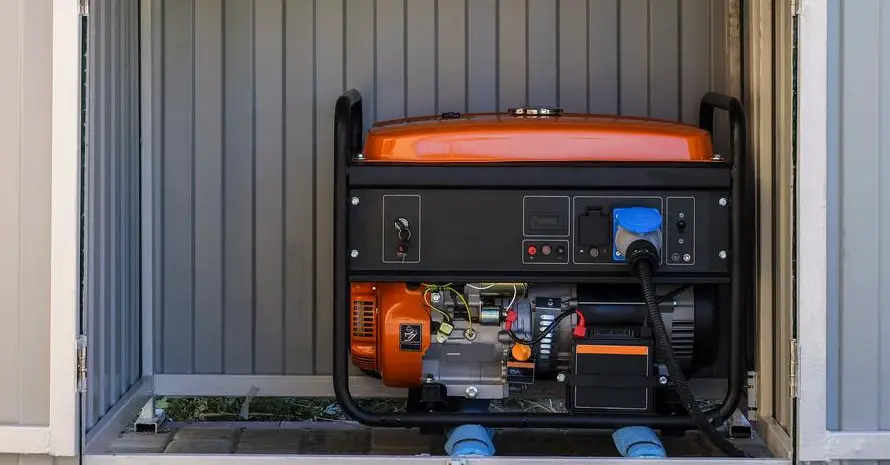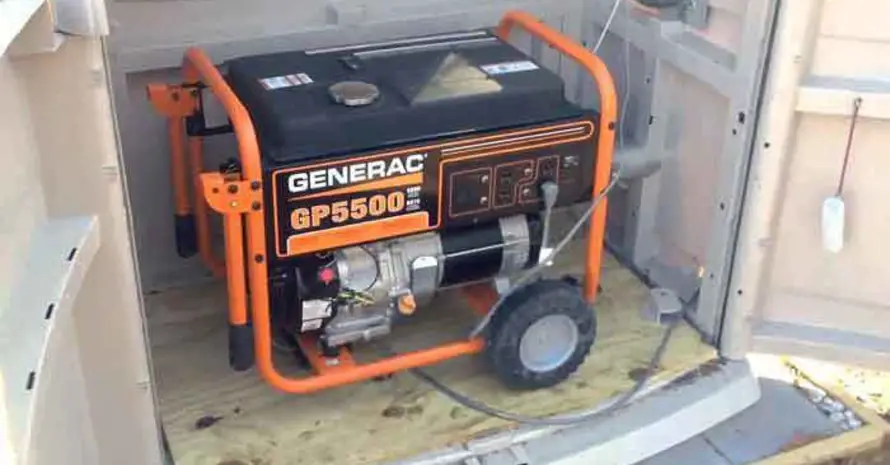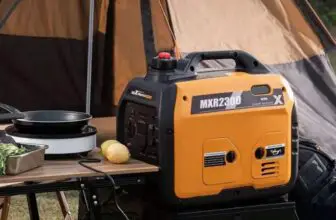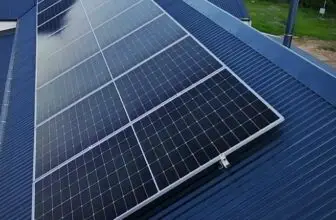
A generator is a great device to have for power outages. It can provide you with light, heat, and power for your home. It is also very helpful for those that use medical devices like oxygen concentrators, CPAP machines, or even dialysis machines.
In addition, a generator can be used to charge battery banks for your cell phones, laptops, and other devices.
We have all experienced it. A generator running at a worksite, sporting event, or other location, is too loud. These machines can be extremely noisy and may cause damage to the hearing of people working around them.
It is important to note that hearing damage is often not immediately noticeable. This means that the damage may have already been done before the individual realizes there is a problem. So it is extremely important to know how to quiet a generator. Read on to find out.
Why Are Generators So Noisy?
Contents
Technically, generators are simple machines that consist of a rotating assembly that converts mechanical energy into electrical energy. However, they are quite noisy and can be a nuisance for people who live near them.
While a generator may not be noisy to the owner, the sound levels generated by the machine can be quite loud and annoying to neighbors. The reason why generators are so noisy is because of the way they are designed.
Generators are designed to produce a maximum amount of energy to power high-power devices. However, they are not designed to produce a minimal amount of energy with a quiet operation. Here are the main reasons for noisy generators.
Mains Power
The rotating assembly that converts mechanical energy into electrical energy is called a rotor. This rotor is attached to a shaft that has an internal combustion engine or an electric motor attached to it. When an electric generator is operating on mains power, it will be relatively quiet.
The main reason why generators are so noisy is that they are often used as temporary sources of power for construction sites, emergency locations, or when the power grid is overloaded or down.
Lack of maintenance
Another major reason why generators are so noisy is that many people who use them do not properly maintain their appliances. If a generator has not been properly maintained, it can cause the internal components to wear out much more quickly.
As the components wear out, they will make more noise. For example, if a generator has not been properly greased and the bearings in the generator have worn out, the generator will make more noise as it turns.
Lack of noise control
Even if a generator has been properly maintained, it will still be noisy. The reason for this is that most generators are not equipped with noise control systems. If the appliance is being used in a residential neighborhood, the sound will be much more noticeable.
Fortunately, there are companies that specialize in noise control, and they can install systems that will reduce the noise from generators. In some cases, there are even sound blankets that can be installed on the exterior of the generators to help reduce the noise.
How to Find the Quietest Generator?
There are several factors that go into making a generator quiet. The quietest generators are the ones that have the best combination of the following factors.
- Size – The smaller the generator, the less noise it will make. A smaller generator means that less fuel is used, and it will be much quieter than a larger generator.
- Weight – The lighter the device, the less noise it will make.
- Fuel Type – The quietest generators are the ones that use the least amount of fuel. Typically, a generator that uses natural gas will be much quieter than one that uses gasoline.
- Fuel Tank Location – How a generator carries its fuel can affect how noisy it is. The more fuel that is carried in the front of a generator, the louder it will be. The more fuel that is carried in the rear of a generator, the quieter it will be.
- Exhaust System – How a generator exhausts its exhaust is another important factor in how quiet it will be. Inverted V-shaped exhaust systems are the quietest exhaust systems.
- Vibration Isolation – The quieter a generator is, the more it should be isolated from the earth. You should buy a generator that has a rubberized pad on the bottom of it. The more the pad is in contact with the ground, the more vibration it will isolate from the earth.
- Soundproofing – Soundproofing is a must when making generators quieter.
- Technology – The latest technology in generator technology is very quiet. Today’s inverter generators are great at being quiet.
- Brand – Some brands are better than others at producing quiet generators. You will find that the best brands of generators are Yamaha, Honda, Kohler, and Generac.
- Location – The more isolated a generator is from the user, the quieter it will be.
How to Make a Generator Quiet?
It is a very common problem when dealing with a generator, especially a portable one, to have the appliance sound annoyingly loud. This tutorial will show you how to quiet down a generator.
-
- Maintenance – Make sure you do regular maintenance on your generator. This will help to reduce noise and will also help to keep it from breaking down.
- Start It Up – The noise from the exhaust is partially due to the fact that it is so low on the ground. If you start it up and let it run for a few minutes before shutting it down, the exhaust will have a chance to heat up. This will lower the amount of noise it makes when it is running.
- Use the Right Fuel – If you are using your generator in warmer weather, using the right fuel can help keep it from making noise. Using the right fuel will help to keep it from knocking.
- Throttle it Down – Some people find that throttling it back to a slower speed will make it quieter. When you are running certain things, like a good pump, you will need to run it faster. But when you are just trying to run a few lights and a TV, you will be better off by throttling it back.
- Keep it Up High – If possible, keep your generator up off the ground. This will help to keep the exhaust pipe from getting clogged.
- Take Care of the Muffler – The muffler on your generator is there to keep it from making so much noise. If the muffler gets damaged or clogged, it will make more noise than normal. Make sure that you keep it in good shape.
- Keep it Clean – If the muffler gets clogged with soot, it will make more noise than normal. Keep it clean, and you should notice a difference.
- Get the Right Size Generator – Most people working with a generator for emergency power are using them to run a few appliances. The noise from these appliances is more than enough to keep you from hearing the engine. If you have a larger generator, you may want to consider using it to run bigger appliances.
- Stay Cool – The noise from the engine is partially due to the fact that it is running hot. If you can help it, don’t run it when it is hot outside. It will make more noise.
- Get Some Air – Make sure that the air vents are clear and the generator has good airflow. This will help to keep the engine cooler and will help to keep it from making so much noise.
- Keep the Oil Clean – Dirty oil will cause the engine to make more noise and will also cause it to break down faster. Keep the oil clean, and you will be rewarded with a longer-running engine.
- Get it Balanced – Using a generator for long periods of time can cause it to get unbalanced. This can also make the engine make more noise than normal. If you are using it for a long period of time, it would be a good idea to have it balanced every so often.
- Use Quiet Mufflers for Generator – Use a muffler on the exhaust. A muffler for the generator will allow the engine to run more smoothly, resulting in a quieter operation.
- Use a Concrete Pad – Put the generator on a concrete pad. This will reduce the number of vibrations being transmitted from the generator, which can reduce the noise.
Tips for Quieting a Generator
There are several ways to get a generator to be quieter. Not only will these tips help you to be able to hear yourself think, but they will also help keep your neighbors from complaining about the noise.
- Run it for only a short amount of time.
- Use a generator on days that are not very windy.
- Choose the location wisely.
- Never run it while sitting on a hard surface.
- Use it on a rubberized pad.
- Use quiet accessories.
Generators, especially those made for the home, are designed to be as quiet as possible while still providing enough power to keep your house running.
The cost of making a generator as quiet as possible is to reduce the amount of power it produces, which can become a problem when you’re running on a generator for a long time or when you’re trying to power a lot of electronics.
FAQs
Here are some frequently asked questions about generators and how to deal with their noise.
Why do generators make a squealing sound?
If the generator is making a squealing sound, it could be that the engine is moving too quickly. This usually indicates that the engine is running too fast. It could also be the belts rubbing against the metal, or it could be that the engine bearings are worn or low on engine oil.
How do I stop the generator from making a thumping noise?
If you are hearing a thumping noise from your generator, it is important to stop the noise and then address the cause of the thumping noise. If the engine is running too quickly, you will need to adjust the engine to a lower speed. If the belts are rubbing against the metal, you will need to tighten the belts. If the engine bearings are worn, you will need to adjust the engine and change the oil.
Why are Honda generators so quiet?
This is due to the design of the generator and the use of advanced materials to produce the product. Honda generators are so quiet because they use a “whisper” muffler technology. This technology is one of the reasons why Honda generators are so popular among campers.
How can I tell if my generator has an exhaust muffler?
Exhaust mufflers can be purchased for most portable generators. However, if you have a gasoline generator, you will have to remove the muffler to check for a tag that shows the part number. If you do not see a tag, then you have a noise reduction unit.
How do I install an exhaust muffler?
Usually, the exhaust muffler is bolted onto the engine exhaust manifold. If not, installation instructions are included. If you cannot find the installation instructions, then contact the dealer or manufacturer.
Conclusion
Generators are great to have for power outages. However, if you are looking for the quietest generator, you will want to choose one that has the best combination of the factors listed above. A generator that has a small size, lightweight, natural gas fuel, rear-mounted fuel tank, inverted V-shaped exhaust system, rubberized pad, soundproofing, and latest technology will be the quietest generator. A generator that is mounted on a trailer is also the quietest generator.
So there we have it. There are several ways to silence a generator. I’ve shown you some of the techniques that I use. The first thing that you need to do is to try and figure out what is causing the noise and then go about fixing that issue. If you can’t figure it out or don’t know how then consult a professional.
Be safe and stay tuned for more useful articles.








